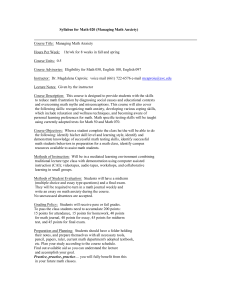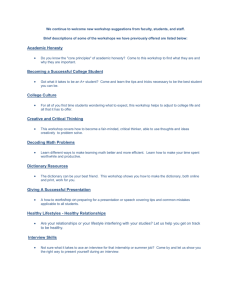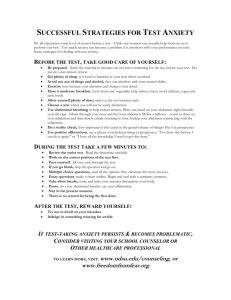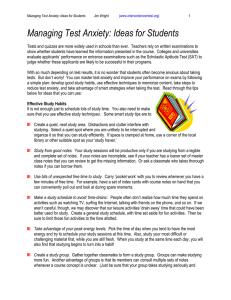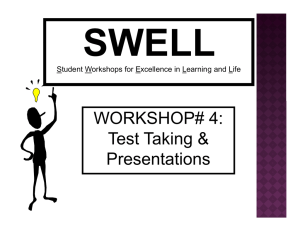exam prep and test taking skills
advertisement
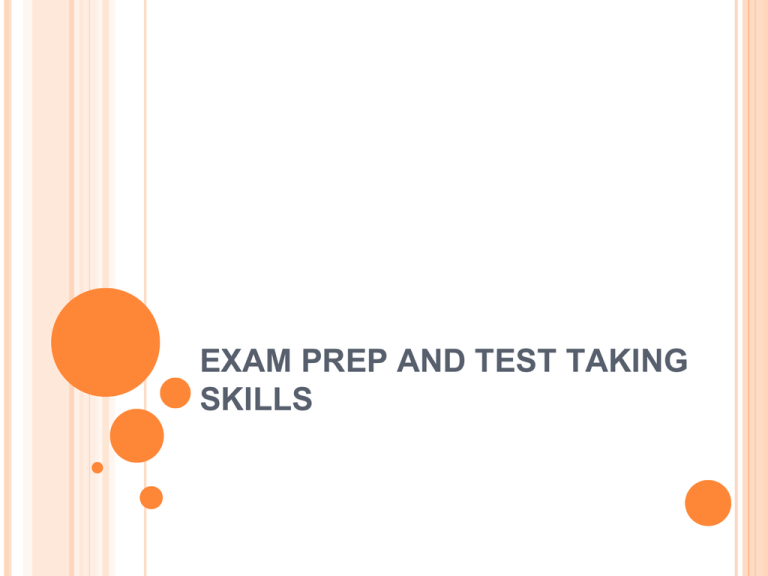
EXAM PREP AND TEST TAKING SKILLS GROUP ACTIVITY ● Introduce yourself to the person next to you -Share your name, your major and your hometown ● Now share a positive or negative test experience with that person: ● Tell each other about what strategies were you using during this test experience? ● What successful strategies could you implement? ● Take 15 mins WE WILL COVER… • Exam Preparation • Exam Taking • Post Exam • Test Anxiety IMPORTANT TIPS FOR EXAM PREP • Keep notes and handouts organized by date then topic • Organize your time to allow for opportunities to review regularly. • Make appointments with professors, tutors, and peers to review content and clarify understanding. QUESTIONS TO THINK ABOUT AS YOU PREPARE FOR YOUR EXAM: • What material will be covered? • What is the format of the exam? • How many points is each item worth? • How much time will you have? • How does the professor define short answer and/or essay? • How does the professor recommend preparing for the exam? PREPPING YOUR BRAIN • • SQ3R Study System • Talk / Meet • Tutor DIFFERENT TYPES OF EXAMS • Objective Tests • Short Answer Tests • Essay • Procedural HOW TO ANSWER MULTIPLE CHOICE QUESTIONS • Read • Identify/Underline • Guess • Review • Eliminate • Choose/Check • Should you change your answer? EXAMPLE OF A MULTIPLE CHOICE QUESTION • Who is the current President of the United States? ● A) Bill Clinton ● B) Barack Obama ● C) Steve Privett ● D) Kanye West ● E) None of the above TRUE/FALSE QUESTIONS ● Every part of sentence must be true ● Pay close attention to: • Negatives • Qualifiers • Absolute • Long Sentences • Guessing ESSAY TESTS ● Time schedule ● Read ● Your own words ● Think ● Topic/Idea ● Get right to the point ● Argument & Support ● Grammar ● No blanks! BEFORE THE EXAM • Sleep • Breakfast • No caffeine! • Arrive early • Choose your seat wisely • Be prepared WHEN RECEIVING THE EXAM • Do a data-dump. • If you don’t know a question move on. • Manage your time and answer every question. AFTER THE EXAM • Review corrected exam and feedback • Compare notes with peers • Meet with professor to discuss your own questions • Learn what you don’t know. TWO FORMS OF TEST ANXIETY ● Mental ● Physical REDUCING TEST ANXIETY • Establish a positive mindset before test by thinking about your successful experiences • Write down at least one of your experiences of success • Keep things in perspective • Challenge negative thoughts • Frequently remind yourself of positive experiences • Negative vs. Positive Thought Patterns MENTAL SIGNS OF TEST ANXIETY • Mental blank-out • Racing thoughts • Difficulty concentrating • Negative thoughts about: • ● past performance ● consequences of failure ● how everyone else is doing Knowing the answers after the test, but not while taking it PHYSICAL SIGNS OF TEST ANXIETY ● Nausea ● Cramps ● Faintness ● Sweating ● Headache ● Dry mouth ● Increased breathing rate ● Fast heartbeat ● Tense muscles ACTIVITY • • Test Taking Anxiety Worksheet SOURCES • • Harrington, C., & Weir-Daidone, E. (2013). Student Success in College: Doing what works! Boston: Wadsworth, Cengage Learning. • Feldman, R. (2009). POWER Learning. New York: McGraw-Hill Higher Education. The Learning & Writing Center Cowell 215 415-422-6713 www.usfca.edu/lwc Kimberly Harris kcharris@usfca.edu
